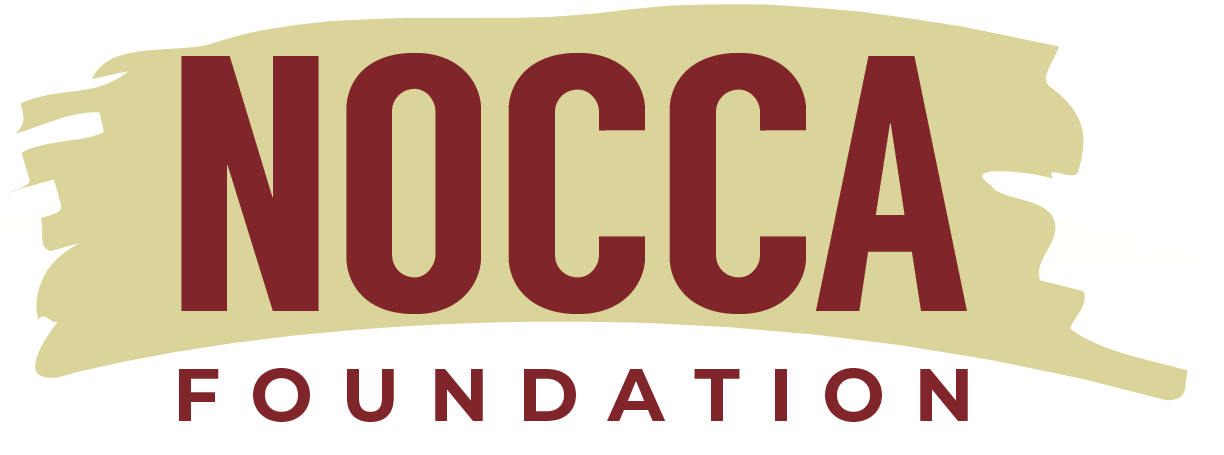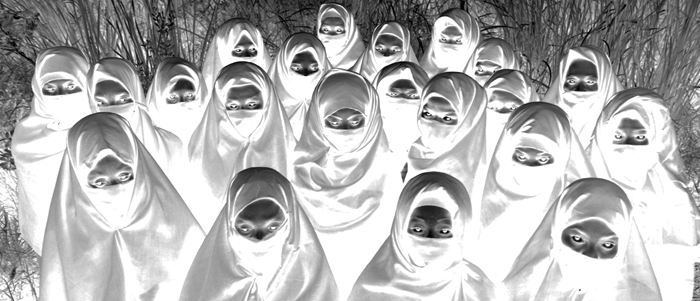NOCCA’s On the Edge Gallery Series continues with: “Off the Beaten Path: Violence, Women, and Art”
featuring work by Yoko Ono, Elisabeth Sunday, and more
October 22 through December 16, 2011
Opening reception: October 22, 5pm – 8pm
The Ken Kirschman Artspace and The NOCCA Institute are proud to announce the next offering in the 2011-12 On the Edge gallery series: “Off the Beaten Path: Violence, Women, and Art”. The opening reception for this show will be Saturday, October 22, 2011, from 5pm to 8pm, and the exhibit continues through December 16, 2011.
The touring group exhibit, produced and curated by Art Works for Change, will be on view as part of the Prospect.2 citywide art biennial. Featured artists include Laylah Ali, Icelandic Love Corporation, Yoko Inoue, Miri Nishri, Yoko Ono, Fatou Kande Senghor, and Elisabeth Sunday. The Ken Kirschman Artspace is located on NOCCA’s campus at 2800 Chartres St., New Orleans. Gallery hours are Monday through Friday, 9am to 1pm, and Saturday, 12pm to 4pm. Admission is free.
-Bios-
Laylah Ali
Laylah Ali was born in Buffalo, New York in 1968, and lives and works in Williamstown, Massachusetts. She received a BA from Williams College and an MFA from Washington University in St. Louis, Missouri. Laylah Ali has had solo exhibitions at the Museum of Modern Art, New York; ICA, Boston; MCA Chicago; Contemporary Art Museum, St. Louis; and MASS MoCA, among others. Her work was exhibited at the Venice Biennale (2003) and the Whitney Biennial (2004).
Icelandic Love Corporation
The Icelandic Love Corporation is a group of three artists: Sigrún Hrólfsdóttir (1973), Jóní Jónsdóttir (1972) and Eirún Sigurdardóttir (1971). They graduated from the Icelandic College of Arts and Crafts in 1996. Since then, they have lived and studied in New York, Berlin and Copenhagen and are currently based in Reykjavik.
Yoko Inoue
Yoko Inoue is a multi-disciplinary artist who uses the mediums of sculpture, installation, collaboration, and public intervention performance to explore the commoditization of cultural values, assimilation and identity issues. Her work has been shown nationally at Brooklyn Museum, Sculpture Center, Rubin Museum, The Bronx Museum, LMCC, Momenta Art and Art in General in New York, Des Moines Art Center in Iowa, Yerba Buena and UCLA in California. She has received many awards including NYFA Fellowship in Sculpture (2003) and in Cross-disciplinary/Performative work (2007), Lambent Fellowship (2004-06) from The Tides Foundation, Franklin Furnace Fund for Performance Art (2005), The Joan Mitchell Foundation Grant (2005), Guggenheim Fellowship (2006), GAPS (Grant for Art in Public Spaces) from Lower Manhattan Cultural Council/9-11 Fund (2007), Jerome Foundation Travel and Research Grant (2007), and the Civitella Ranieri Fellowship (2008). Residencies include Skowhegan, Atlantic Center for the Arts, Art Omi, LMCC Workspace, Smack Mellon, The Center for Book Arts, .ekwc in The Netherlands, and Civitella Ranieri Residency in Italy.
Miri Nishri
Miri Nishri, an interdisciplinary artist, was born in Colombia in 1950 and immigrated to Israel with her family when she was seven years old. She studied construction engineering at Ort Technicum, and art at Hamidrasha College for Arts (today a part of Beit Berl), and teaches art at the Tel Aviv Museum. Nishri is the winner of the 1988 Oscar Handler Prize for artists and the 1996 Award of the Israeli Minister of Education & Culture. Her works range between painting, photography, video art and installations, and were shown in exhibitions in galleries, museums and festivals around the world, including: Tel Aviv Museum of Art, Israel Museum, Haifa Museum of Art, Ramat Gan Museum of Israeli Art, “Luleå Summer Biennale” (Sweden), “Olympolis Project” (Greece), “Human Emotions Festival” (Rome, Italy), “Stuttgarter Filmwinter” (Germany) and Stenersen Museum (Oslo, Norway).
Yoko Ono
Yoko Ono, born February 18, 1933, is a Japanese artist, musician, author and peace activist. She is known for her work in avant-garde art, music and filmmaking as well as her marriage to famous musician John Lennon. Ono brought feminism to the forefront in her music, which prefigured New Wave music, and is known for her philanthropic contributions to the arts, peace and AIDS outreach programs. In 2001, YES YOKO ONO, a forty-year retrospective of Ono’s work, received the prestigious International Association of Art Critics USA Award for Best Museum Show Originating in New York City, considered one of the highest accolades in the museum profession. In 2002, Ono was awarded the Skowhegan Medal for work in assorted media. In 2005, she received a lifetime achievement award from the Japan Society of New York. Ono received an honorary Doctorate of Laws from Liverpool University in 2001, and in 2002, she was presented with the honorary degree of Doctor of Fine Arts from Bard College. In 2008, she showed a large retrospective exhibition, Between The Sky And My Head, at the Kunsthalle Bielefeld, Bielefeld, Germany, and the Baltic Centre for Contemporary Art in Gateshead, UK. She also received a Golden Lion Award for lifetime achievement from the Venice Biennale in 2009. Wish Tree, her installation in the Sculpture Garden at the Museum of Modern Art, New York (since July 2010), has become very popular, with contributions from all over the world.
Fatou Kande Senghor
Fatou Kande Senghor, born in 1971 in Senegal, lives in Dakar. She is a multifaceted visual artist, working as a film director, photographer, cameraman, producer, lecturer and costume designer. As a co-founder of the Waru Studio (Dakar), a platform of dialogue for filmmakers of her generation, she works on exploring new technologies as an alternative to the dying film industry and a voice to the peoples of the rich and misunderstood continent— Africa. Fatou worked as a cameraman with Wim Wenders on the short movie “The Invisible,” a film about women that were raped by the May May warriors during the war in Congo. She has also written in numerous publications about the African experience in film and about gender issues in the African context.
Her video/performance/ installation, On quest for modern Africa, was presented on Dak’Art 2004: The Biennial of Contemporary African Art, Dakar (2004). In 2006, she followed an invitation by Okwui Enwezor, curator of Snap Judgments: New Positions in Contemporary African Photography, at the International Center of Photography in New York, presenting photos of an abandoned and derelict Court of Law in Dakar.
Elisabeth Sunday
Elisabeth Sunday came from three generations of visual artists; her father, Douglas Phillips, was a Cleveland-based, stained glass window designer and her mother, Jane Spangler, was an Oakland, California-based three-dimensional and ceramic artist. But it wasn’t until her grandfather, painter Paul B. Travis of Cleveland, gave her a camera at age 15 that she began photographing and discovering her niche in a cluster of accomplished artists. Sunday had her first exhibition while still in high school in Oakland, and continued to photograph in college at Humboldt State University. After college, in 1980, Elisabeth Sunday moved to Paris for four years where she had a studio and studied the figure and portraiture. Sunday’s interest in indigenous people extends back as far as she can remember; as a teen, she photographed Native Americans and was interested in isolated cultures like the Amish within the United States. Once she got to Paris in 1980, Sunday met people from all over and became fascinated by their faces. When she returned home in 1984, Elisabeth Sunday began photographing the Southwest and then in 1986 turned her attention to Africa where she continues to photograph today. Other places that have captivated her eye include Southeast Asia, Australia, and Micronesia.
About Art Works for Change
Art Works for Change (AWFC) is a non-profit organization that produces traveling contemporary art exhibitions addressing some of the most pressing social issues facing the global community, such as social justice, human rights, gender equity and environmental sustainability. Through its partnerships with museums, advocacy and educational organizations, AWFC utilizes the transformative power of art to foster social change by promoting awareness and provoking dialogue and action in communities.

